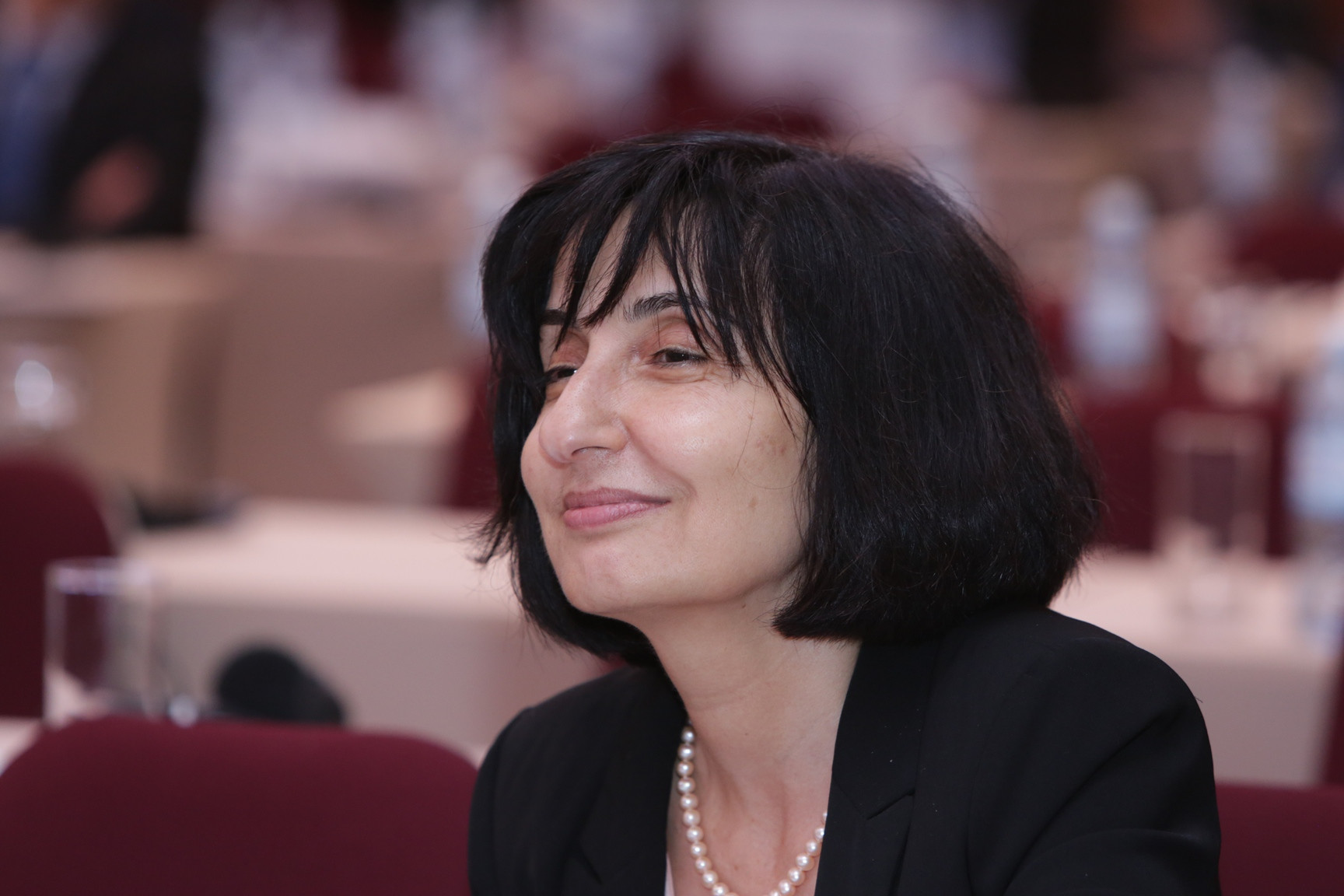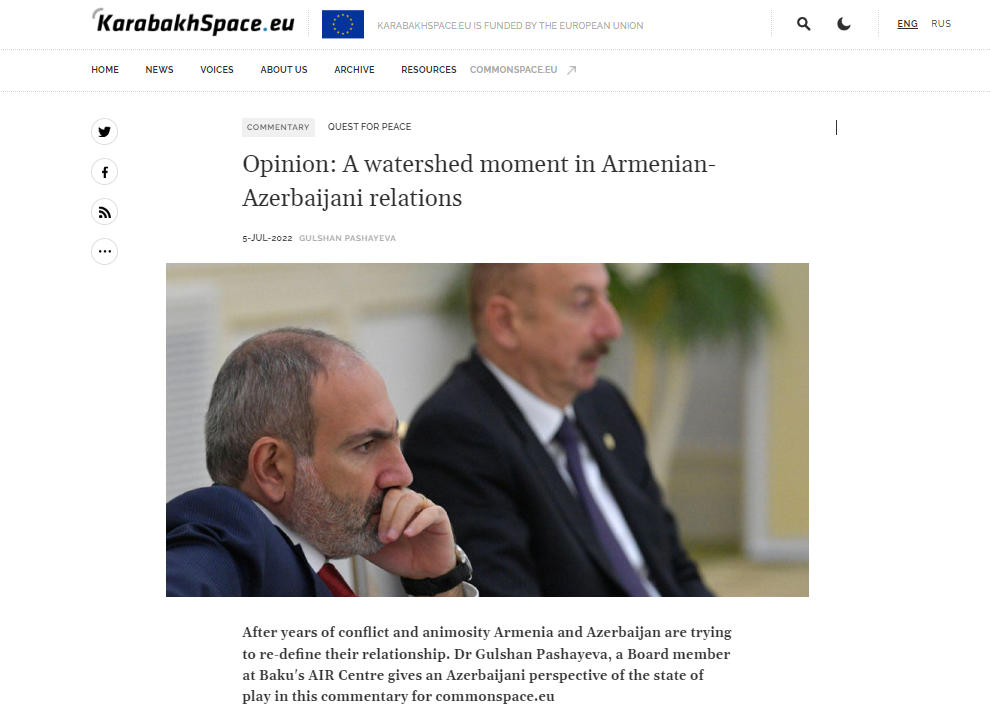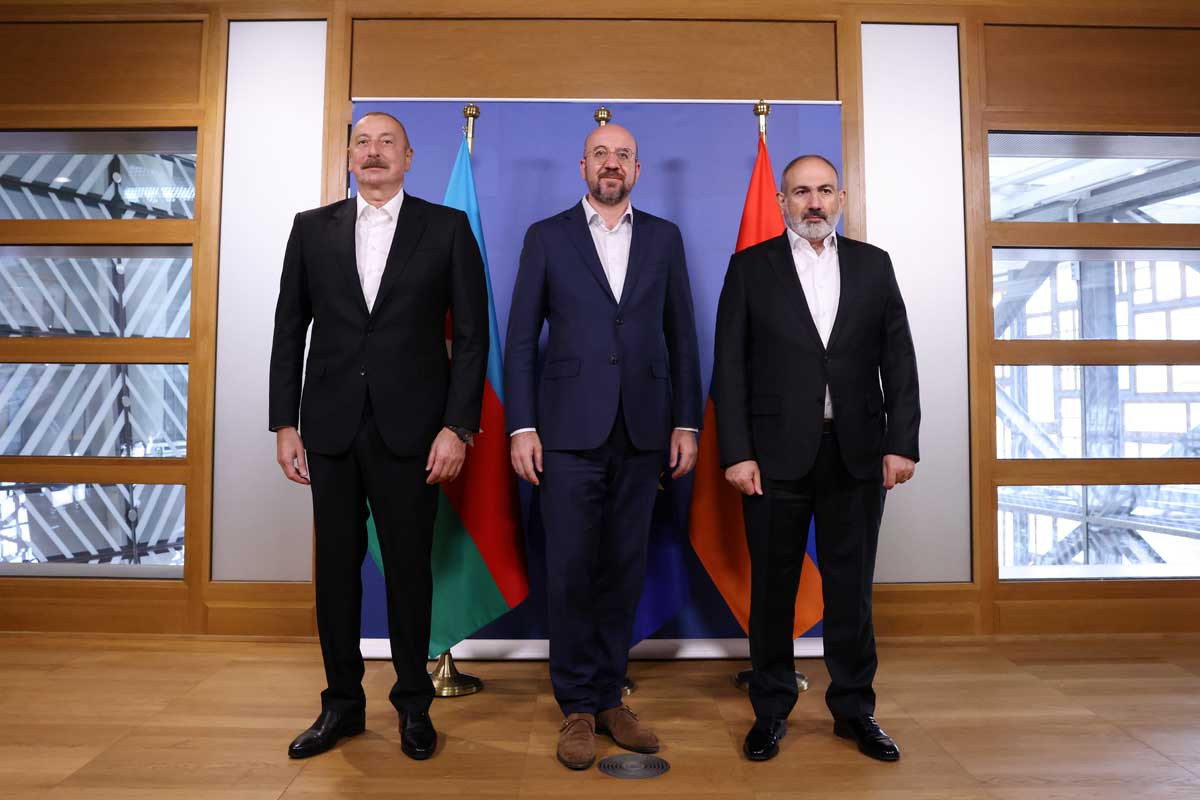After years of conflict and animosity Armenia and Azerbaijan are trying to re-define their relationship. Dr Gulshan Pashayeva, a Board member at Baku's AIR Centre gives an Azerbaijani perspective of the state of play in this commentary for commonspace.eu
2022 marks a new stage in the interaction between Armenia and Azerbaijan, two neighbouring states that have not had any diplomatic relations since regaining their independence in 1991. Recent months have been characterized by increasing face-to-face contacts between officials of the respective governments.
The necessary conditions for such a critical turning point were met as a result of the Second Karabakh War and the content of the November 10, 2020 statement signed by Azerbaijani President Ilham Aliyev, Armenian Prime Minister Nikol Pashinyan, and Russian President Vladimir Putin that ended the almost 30-year-long Armenian occupation of Azerbaijani territories. At the time, Russia played a key role in achieving the abovementioned Tripartite Statement along with two subsequent documents signed by the leaders of Armenia, Azerbaijan, and Russia in Moscow and Sochi on January 11, 2021, and November 26, 2021, respectively, under the auspices of Russian President Vladimir Putin.
On December 14, 2021, the European Council President, Charles Michel, hosted Azerbaijani President Ilham Aliyev and Armenian Prime Minister Nikol Pashinyan in Brussels, after which both leaders agreed to follow up on the outcomes of this meeting. In 2022, two further meetings in this format between Azerbaijani and Armenian leaders have so far been organized by President Michel in Brussels, on April 6 and May 22, respectively. Another meeting is also envisaged in the same format in July or August 2022. Thus, at the moment, this new format set up by President Michel has become an additional platform providing a fresh impetus to the negotiation process and contributing to the first direct interaction of the respective Armenian and Azerbaijani high-level government officials in 2022. Three examples of these interactions can be noted:
On March 30, 2022, Assistant to the President of the Republic of Azerbaijan Hikmet Hajiyev and Secretary of the Security Council of the Republic of Armenia Armen Grigoryan met in Brussels and reviewed the full spectrum of the issues between Armenia and Azerbaijan as a follow-up to the understandings reached during the first meeting in Brussels on December 14, 2021. They spoke both one-on-one and through the facilitation of the EU Special Representative for the South Caucasus and the Crisis in Georgia, Toivo Klaar.
On April 11, 2022, the first direct phone conversation in about 30 years occurred between the Azerbaijani and Armenian Foreign Ministers, Jeyhun Bayramov and Ararat Mirzoyan. They discussed matters relating to the future peace treaty, humanitarian issues, and the establishment of the Joint Border Commissions as a follow-up to the agreements reached during the second meeting between Azerbaijani and Armenian leaders in Brussels on April 6, 2021
On May 24, 2022, the Joint Border Commissions, led by Azerbaijani and Armenian Deputy Prime Ministers Shahin Mustafayev and Mher Grigoryan, met for the first time without any intermediaries on the state border between Armenia and Azerbaijan, which was a tangible result of the understanding reached during the third meeting in Brussels on May 22, 2022. The National Border Commissions, which were established by decrees of the Azerbaijani and Armenian leaders signed one day earlier, on May 23, 2022, aim to address all questions relating to the delimitation of the border and how best to ensure a stable situation.
The Azerbaijani National Commission includes government officials from 22 agencies, including the Deputy Prime Minister of the Nakhchivan Autonomous Republic, several deputy ministers, deputy chiefs of state services, a department head at the Presidential Administration, as well as the heads of several local executive authorities of the districts that share borders with Armenia (Gazakh, Agstafa, Tovuz, Gadabay, Dashkasan, Kalbajar, Lachin, Gubadli, and Zangilan). The Armenian National Commission consists of government officials from ten agencies, including four deputy ministers, deputy chiefs of state services, as well as senior employees of the National Security Service and the General Staff of the Armed Forces of Republic of Armenia. It is expected that a second meeting of the Joint Border Commissions will be arranged in Moscow and a third in Brussels in the near future, which can be seen as a balancing act between the two leading intermediaries.
Despite this positive trend, so far not much progress has been achieved. For example, despite the establishment of a trilateral working group on the unblocking of all economic and transport communications based on the provisions of the January 11, 2021 Statement, and the fact that more than ten meetings have been held, outcome seems elusive. The statement signed by the Azerbaijani, Armenian, and Russian leaders seeks to outline steps for the implementation of Article 9 of the November 10, 2020 Trilateral Statement. This article provides an explicit assurance that new transportation communications linking the Nakhchivan Autonomous Republic with the western regions of Azerbaijan will be constructed and Armenia will guarantee the safety of this particular transportation communications route in order “to organize an unimpeded movement of citizens, vehicles and goods in both directions.” It is envisaged that the railway and automobile communication route, termed the “Zangazur Transportation Corridor,” will be built in a 44-km-long stretch of territory within Armenia and will unite the main territory of Azerbaijan with its exclave, the Nakhchivan Autonomous Republic. However, the Armenian side has, seemingly, been delaying this process.
On the other hand, according to Article 6 of the November 10, 2020 Trilateral Statement, Azerbaijan shall guarantee “the safety of citizens, vehicles and goods traveling along the Lachin corridor in both directions.” Azerbaijan has fully complied with this obligation so far, and unimpeded transportation of citizens, vehicles, and goods in both directions is ensured between Armenia and the Karabakh region inhabited by the Armenian population of Azerbaijan where the Russian Federation’s peacekeeping contingent has been temporarily deployed.
While addressing the 9th Global Baku Forum on June 16, 2022, Azerbaijani President Ilham Aliyev touched upon this issue and emphasized that, for one and a half years, Armenians have been using the Lachin road providing an unimpeded connection, but Azerbaijanis cannot do the same through the Armenia–Zangazur corridor to connect with Nakhchivan. In his opinion, this is unfair and the opening of the Zangazur Corridor within a very short time is one of the fundamental elements of future peace in the region and, if such an access is not provided to Azerbaijan, it will be difficult to talk about peace
Furthermore, since the end of the Second Karabakh War, Azerbaijani President Ilham Aliyev has repeatedly stated that Azerbaijan is ready to sign a peace treaty with Armenia, but no response was given by Armenia at the time. A few months ago, the Azerbaijani government also put forward a proposal with five basic principles for the establishment of relations between the two states. On March 31, 2022, the Armenian Prime Minister Nikol Pashinyan also expressed readiness to sign a peace treaty with Azerbaijan and to immediately launch peace talks
This important development was discussed between the Azerbaijani and Armenian leaders at the third meeting held in Brussels on May 22, 2022, and it was agreed to advance discussions on the future peace treaty governing inter-state relations between Armenia and Azerbaijan and confirmed that teams led by the Foreign Ministers will take this process forward. Azerbaijani President Ilham Aliyev also touched upon this issue when addressing the 9th Global Baku Forum and noted that Azerbaijan has already established the Azerbaijani commission on the peace treaty and, as soon as Armenia sets up such a commission, negotiations can start
However, in light of the above, it is important to add that, at the third meeting held in Brussels on May 22, 2022, President Michel stressed the necessity of addressing the rights and security of the ethnic Armenian population in Karabakh.
Suffice it to say that, in this context, the fate of the Armenian population of Karabakh is a core and very sensitive issue that occupies a particular place in Armenian–Azerbaijani relations. As a matter of fact, Armenian ethno-nationalists from the former Nagorno-Karabakh Autonomous Oblast (NKAO) were at the epicenter of the protracted ethno-territorial conflict between Armenia and Azerbaijan. It is worth noting that NKAO was artificially created by Soviet leaders within Soviet Azerbaijan on July 7, 1923 as an autonomous unit borders of which were drawn in such a way in order to include as many Armenian-populated villages and to exclude as many Azerbaijani villages as possible. At the same time, Soviet Armenia was behind the mobilization of Armenian ethno-nationalists from NKAO who demanded the transfer of this Armenian-dominated region from the jurisdiction of Soviet Azerbaijan to Soviet Armenia in the late 1980s. Despite the rejection of the NKAO’s appeal by Soviet Azerbaijan and the vain attempts of the Soviet leadership to deal with this conflict, it was impossible to solve it due to Soviet Armenia’s continuous support of its own kin in NKAO at the time. Ultimately, the National Assembly of Azerbaijan had to dissolve the NKAO as an administrative division of Azerbaijan on November 26, 1991, through the Law on Abolishment of Nagorno-Karabakh Autonomous Oblast.
After Azerbaijan and Armenia regained their independence in 1991, in order to avoid accusations of irredentist claims, Armenia, as a kindred-state together with its kin in Azerbaijan, started to demand the right of the people of Nagorno-Karabakh to self-determination, which in practical terms meant secession . This irresponsible demand led to the First Karabakh war and the occupation of almost one-fifth of the internationally recognized territory of Azerbaijan, consisting of nearly all of the territory of the former NKAO and an additional seven adjacent Azerbaijani administrative districts (Lachin, Kalbajar, Agdam, Fuzuly, Jabrayil, Gubatli, and Zangilan) that had never been populated by Armenians. At the same time, their former inhabitants – about 700,000 Azerbaijanis – were killed or forcibly expelled from their places of origin, additionally 3,890 Azerbaijani citizens (including 71 children, 267 women and 326 elderly people) have been missing up to this day as a result of this war.
On the other hand, united around the Karabakh issue, representatives of the Armenian Diaspora played a significant role not only in providing the necessary political, economic, military, financial, and information support for Armenia and the separatist regime created in the then-occupied Azerbaijani territories, but also worked very hard to misrepresent the nature of this conflict. In fact, they were able to transform Azerbaijan’s attempts to reassert control over its territory into an act of ‘aggression’ by Azerbaijanis and combine it with the threat of a ‘second genocide’ against Armenians. Incidentally, they have also tried to use this narrative and misrepresent the current situation that emerged after the Second Karabakh War.
Thus, after Armenia’s defeat in this war, many in the country called for Armenian Prime Minister Nikol Pashinyan to resign. Following his resignation, snap parliamentary elections took place on June 20, 2021. However, Pashinyan’s Civil Contract Party won those elections, which proved once more that the idea of national revenge was not in demand from the broad strata of Armenian society. That is why the leaders of the ‘old elite,’ such as former presidents of Armenia Robert Kocharyan and Serzh Sargsyan, were unable to consolidate Armenian society around them, even in the wake of its dissatisfaction with the military defeat in the Second Karabakh War.
Over the past two months, Armenian Prime Minister Nikol Pashinyan has faced a wave of protests by the Armenian opposition after saying in the Armenian Parliament on April 13, 2022, that the international community wanted Armenia to “lower the bar” concerning the question of the status of Nagorno-Karabakh. Reiterating in his speech that Armenia has never had territorial claims on Azerbaijan, the Armenian Prime Minister noted that “status in the current situation is not a goal, but rather a means to guarantee the security and rights of the Armenians of Nagorno Karabakh.” This development was poorly received by the Armenian opposition, who suspect that the Armenian Prime Minister is laying the groundwork for significant concessions. Furthermore, in June 2022, during a visit to Qatar, Pashinyan gave an interview to international radio broadcaster Al Jazeera. In answer to a question, he mentioned that the November 10, 2020 Trilateral Statement does not address the Nagorno-Karabakh issue but, in his opinion, “it is necessary to address the Nagorno-Karabakh issue” and he hopes “that in the near future we will be able to address the Nagorno-Karabakh issue.”
In his speech on June 16, 2022, Azerbaijani President Ilham Aliyev underlined that Azerbaijan fully supports the necessity of addressing the rights and security of the ethnic Armenian population in Karabakh, as stressed by President Michel at the third meeting held in Brussels on May 22, 2022. He also added that Azerbaijan is a multiethnic state and its constitution provides equal rights for representatives of all ethnicities. Stressing that the Armenian population, which has lived in Azerbaijan for many years, is not the country’s biggest ethnic minority, he confirmed that their rights and security issues will be taken care of.
On the other hand, Azerbaijani President Ilham Aliyev expressed dissatisfaction that the Armenian government uses the term “status” “Nagorno-Karabakh’” which, in his opinion, is “absolutely counterproductive and dangerous for Armenia itself, because Nagorno-Karabakh does not exist,” adding that there is no such administrative structure in Azerbaijan, and any reference to its so-called ‘status’ will lead only to a new confrontation.
Armenia as a kindred state should reconsider its external minority policy, and come to a settlement with Azerbaijan on the basis of withdrawing its territorial claims and stop supporting the separatist aspirations of ethnic Armenians living in Karabakh. Only in this case it can make a significant contribution to the normalization of Armenian–Azerbaijani relations. At the same time, there is no doubt that the gradual reintegration of the Armenians of Karabakh into Azerbaijani society will lay a solid foundation for the future peace, stability and development.








